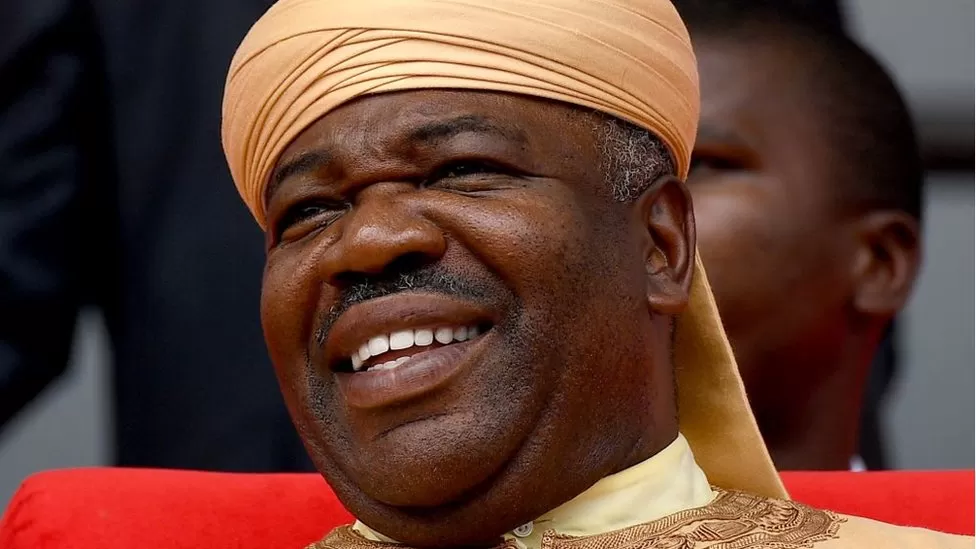World
Who is Ali Bongo, president of Gabon?

Army officers have appeared on national television in Gabon to say they have taken power.
They said they were annulling the results of Saturday’s election, in which President Ali Bongo was declared the winner.
The electoral commission said Mr Bongo had won just under two-thirds of the votes in an election the opposition argued was fraudulent.
His overthrow would end his family’s 53-year hold on power in Gabon.
Gabon is one of Africa’s major oil producers, while nearly 90% of the country is covered by forests.

Twelve soldiers appeared on television early on Wednesday morning, announcing they were cancelling the results of the election and dissolving “all the institutions of the republic”.
They added that the country’s borders had been closed “until further notice”.
If confirmed, this would be the eighth coup in former French colonies in Africa in the past three years.
However, most of the others have been further north, in the Sahel region where an Islamist insurgency has led to rising complaints that the democratically elected governments were failing to protect the civilian populations.
French Prime Minister Elisabeth Borne said her country was following the situation closely, while the European Union’s foreign policy chief said a military takeover would increase instability in Africa.
“This is a big issue for Europe,” said Josep Borrell.
Meanwhile, French mining group Eramet, which employs thousands of people in Gabon, said it had stopped all work in the country for security reasons.

Gabon’s President Ali Bongo is a man of many faces.
To some, he is a spoilt, playboy prince who sees ruling the oil-rich Gabon as his birthright; a one-time funk singer who stepped into his father’s shoes to continue his family’s 50-year rule.
To others, he is a reformer – a man who, they would argue, was voted into power democratically by the masses.
But his recent ill health has pushed tensions to the surface in this country of just more than two million people. On 7 January, a group of soldiers tried – and apparently failed – to take control.
Among their stated reasons was an attempt to “restore democracy” following the 2016 election, which Mr Bongo narrowly won amid accusations of fraud and acts of violence.
Ali Bongo was born Alain Bernard Bongo in neighbouring Congo-Brazzaville in February 1959.
But even his birth was controversial. Rumours, which he has always denied, have persisted for years that he was adopted from the Nigerian south-east at the time of the Biafran war.
The young Alain Bernard was still in primary school when his father Omar Bongo took control of Gabon in 1967. Already, however, the groundwork was being laid for criticisms which would haunt him later in life.
“He wasn’t born in the presidential palace, but almost. He was about eight when his father became president,” François Gaulme, a French historian and author on Gabonese politics, told the BBC.
“The fact that he went to the best schools in Libreville and didn’t learn local languages was something he would get criticised for later on.”
At the age of nine, Ali Bongo was sent to a private school in the upmarket Paris suburb of Neuilly, and later, to the Sorbonne where he studied law. This international upbringing led many in Gabon to view him as an outsider.
Alain Bernard became Ali and his father Omar in 1973, after converting to Islam – the only members of their family to do so.
The decision was widely seen a way to attract investment from Muslim countries. But the elder Bongo, who was previously an animist and not baptised in the Christian faith, also evoked spiritual reasons for his conversion.
It was never all about politics for the young Ali Bongo, however. He showed an early passion for football and music – something inherited from his mother, the Gabonese singer Patience Dabany.
A reputation for being a playboy during his youth was cemented with the release of his 1977 album A Brand New Man, produced by funk legend James Brown’s manager, Charles Bobbit.
“Let me be your darling, Your everything, ’til the end of time,” Bongo crooned on the title track.
Whether his love of funk has remained is unknown. In his more recent years as president, Ali Bongo is said to enjoy jazz, bossa nova and classical music.
Within four years of the album release, he had turned his attention to politics.
Ali Bongo served in his father’s government as minister of defence, a role he held for 10 years. Before that his first appointment, as Gabon’s foreign minister in 1989, ended after three years because of a constitutional change requiring ministers to be over the age of 35. He was 32 at the time.
However, it seems he wasn’t immediately seen as a natural successor to his father.
“In the beginning, the Gabonese people didn’t see [Ali Bongo] as a serious candidate,” said Mr Gaulme.
“But in the end, he has been more thoughtful than he seemed. The first time people saw he could be serious was when he restructured the army.”

Corruption allegations
It is not the only criticism of Mr Bongo’s rule from rights groups.
They allege the Bongo family turned Gabon into a “kleptocratic regime”, looting its natural resources, oil wealth and rainforests, while members of Gabon’s political opposition have long accused family members of embezzling public money and running the country as their private property.
Pictures of Real Madrid fan President Bongo driving Argentinian footballer Lionel Messi around the capital in a flashy car made headlines in 2017.
A seven-year corruption investigation by French police into the Bongo family, which revealed assets including 39 properties in France and nine luxury cars, was dropped in 2017.
There had been insufficient evidence of alleged “ill-gotten gains” to charge any of the family members, reported French news agency AFP.
The family strongly denies all the allegations.


